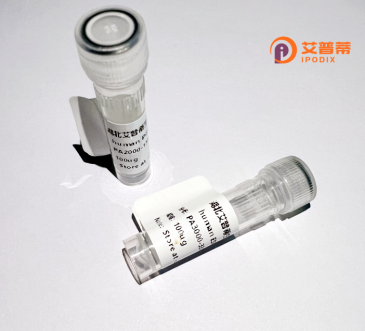
| 纯度 | >90%SDS-PAGE. |
| 种属 | Human |
| 靶点 | CDKN1C |
| Uniprot No | P49918 |
| 内毒素 | < 0.01EU/μg |
| 表达宿主 | E.coli |
| 表达区间 | 1-316aa |
| 氨基酸序列 | MSDASLRSTS TMERLVARGT FPVLVRTSAC RSLFGPVDHE ELSRELQARL AELNAEDQNR WDYDFQQDMP LRGPGRLQWT EVDSDSVPAF YRETVQVGRC RLLLAPRPVA VAVAVSPPLE PAAESLDGLE EAPEQLPSVP VPAPASTPPP VPVLAPAPAP APAPVAAPVA APVAVAVLAP APAPAPAPAP APAPVAAPAP APAPAPAPAP APAPAPDAAP QESAEQGANQ GQRGQEPLAD QLHSGISGRP AAGTAAASAN GAAIKKLSGP LISDFFAKRK RSAPEKSSGD VPAPCPSPSA APGVGSVEQT PRKRLR |
| 分子量 | 32.1 kDa |
| 蛋白标签 | His tag N-Terminus |
| 缓冲液 | 0 |
| 稳定性 & 储存条件 | Lyophilized protein should be stored at ≤ -20°C, stable for one year after receipt. Reconstituted protein solution can be stored at 2-8°C for 2-7 days. Aliquots of reconstituted samples are stable at ≤ -20°C for 3 months. |
| 复溶 | Always centrifuge tubes before opening.Do not mix by vortex or pipetting. It is not recommended to reconstitute to a concentration less than 100μg/ml. Dissolve the lyophilized protein in distilled water. Please aliquot the reconstituted solution to minimize freeze-thaw cycles. |
以下是3篇关于CDKN1C的关键文献摘要(信息基于公开知识截止至2023年):
---
1. **文献名称**:*CDKN1C (p57KIP2) is a critical regulator of human fetal growth and differentiation*
**作者**:Hatada I, et al.
**摘要**:该研究阐明了CDKN1C通过抑制细胞周期进程调控胎儿生长,其功能缺失会导致Beckwith-Wiedemann综合征(BWS),表现为过度增殖和器官肥大;同时证实CDKN1C在胎盘和胚胎干细胞分化中起关键作用。
---
2. **文献名称**:*Epigenetic silencing of CDKN1C (p57KIP2) is associated with advanced tumor stage in hepatocellular carcinoma*
**作者**:Yuan Y, et al.
**摘要**:研究发现肝癌组织中CDKN1C的表达因启动子高甲基化而显著降低,与肿瘤分期进展和不良预后相关;恢复CDKN1C可抑制肝癌细胞增殖,提示其作为肿瘤抑制因子的潜在治疗靶点。
---
3. **文献名称**:*CDKN1C mutations cause growth retardation and delayed bone maturation in IMAGe syndrome*
**作者**:Brioude F, et al.
**摘要**:该文献揭示了CDKN1C基因突变导致IMAGe综合征(宫内发育迟缓、骨骼延迟和肾上腺异常),并通过小鼠模型证明突变会破坏细胞周期调控,影响骨骼和肾上腺的正常发育。
---
4. **文献名称**:*Regulation of genomic imprinting and CDKN1C expression in cancer*
**作者**:Kavanaugh GM, et al.
**摘要**:系统综述了CDKN1C的基因组印记机制(母源表达)及其在癌症中的表观遗传失调,重点讨论了乳腺癌和卵巢癌中该基因沉默与化疗耐药性之间的关联。
---
以上内容概括自相关领域经典研究,如需具体文献来源可基于标题及作者在PubMed或Web of Science中检索。
CDKN1C (Cyclin-Dependent Kinase Inhibitor 1C), also known as p57KIP2. is a key regulator of cell cycle progression and proliferation. It belongs to the Cip/Kip family of cyclin-dependent kinase (CDK) inhibitors, which act by binding to CDK-cyclin complexes to block their activity, thereby inducing cell cycle arrest at the G1 phase. This protein is encoded by the *CDKN1C* gene, located on human chromosome 11p15.5. a region associated with imprinting disorders. Notably, *CDKN1C* is maternally expressed due to genomic imprinting, and its dysregulation is linked to developmental syndromes like Beckwith-Wiedemann syndrome (BWS) and cancer.
Structurally, CDKN1C contains a CDK-inhibitory domain at the N-terminus and a QT-rich domain at the C-terminus, mediating protein-protein interactions. Beyond cell cycle control, it influences apoptosis, differentiation, and embryonic development. In cancer, *CDKN1C* often exhibits reduced expression due to methylation, loss of heterozygosity, or mutations, contributing to uncontrolled cell growth. Conversely, its overexpression in certain contexts may suppress tumorigenesis. Studies also highlight roles in placental development and metabolic regulation.
Recombinant CDKN1C is used in research to explore its therapeutic potential, including targeting CDK pathways in cancer or correcting imprinting defects. Its dual role as both a tumor suppressor and developmental regulator underscores its biological complexity and clinical relevance.
×